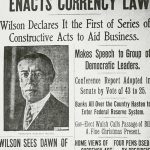 1913 – The Federal Reserve Act is signed by President Woodrow Wilson, establishing the Federal Reserve system. The Federal Reserve Act was passed by the 63rd United States Congress and signed into law by President Woodrow Wilson on December 23, 1913. The law established the Federal Reserve System, the central banking system of the United States.
1913 – The Federal Reserve Act is signed by President Woodrow Wilson, establishing the Federal Reserve system. The Federal Reserve Act was passed by the 63rd United States Congress and signed into law by President Woodrow Wilson on December 23, 1913. The law established the Federal Reserve System, the central banking system of the United States.
 1944 – Wesley Clark is born in Chicago. Clark, is a former general in the United States Army. He graduated as a 1966 class lecturer at West Point and was awarded a Rhodes Scholarship at Oxford University, where he received a degree in Philosophy, Politics and Economics. Clark, played an important role in the NATO campaign in Kosovo.
1944 – Wesley Clark is born in Chicago. Clark, is a former general in the United States Army. He graduated as a 1966 class lecturer at West Point and was awarded a Rhodes Scholarship at Oxford University, where he received a degree in Philosophy, Politics and Economics. Clark, played an important role in the NATO campaign in Kosovo.
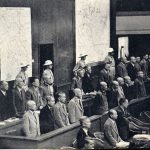 1948 – Seven Japanese military and political leaders convicted of war crimes by the International Military Tribunal for the Far East are hanged. The execution was carried out by the Allied occupation authorities at Sugamo Prison in Tokyo, Japan. This happened after the execution of their German counterparts, following the sentencing by the Nuremberg Trials in 1946.
1948 – Seven Japanese military and political leaders convicted of war crimes by the International Military Tribunal for the Far East are hanged. The execution was carried out by the Allied occupation authorities at Sugamo Prison in Tokyo, Japan. This happened after the execution of their German counterparts, following the sentencing by the Nuremberg Trials in 1946.
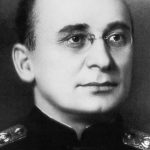 1953 – Lavrentiy Beria is executed at the age of 55 in Moscow. Beria, was a Soviet politician, Marshal of the USSR, administrator of the State Security, and chief of the secret police apparatus (NKVD) under Stalin during and after World War II. After Stalin’s death, Beria was arrested on Khrushchev’s orders, and after a short trial was sentenced to death.
1953 – Lavrentiy Beria is executed at the age of 55 in Moscow. Beria, was a Soviet politician, Marshal of the USSR, administrator of the State Security, and chief of the secret police apparatus (NKVD) under Stalin during and after World War II. After Stalin’s death, Beria was arrested on Khrushchev’s orders, and after a short trial was sentenced to death.
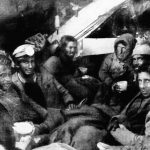 1972 – Six survivors of a flight crash in the Andes are rescued after 73 days after being reported to have survived cannibalism. Among the 45 people on board, 28 survived the crash. In the face of starvation and death, survivors reluctantly turned to cannibalism. After 72 days on the glacier, the 16 survivors were rescued.
1972 – Six survivors of a flight crash in the Andes are rescued after 73 days after being reported to have survived cannibalism. Among the 45 people on board, 28 survived the crash. In the face of starvation and death, survivors reluctantly turned to cannibalism. After 72 days on the glacier, the 16 survivors were rescued.
 1986 – A Voyager, piloted by Dick Rutan and Jeana Yeager, lands at Edward Air Force Base in California. It becoming the first aircraft to fly non-stop worldwide without having to be refueled by air or ground fuel. This record would have remained unbroken to this day, as no other aircraft would have flown without supplies.
1986 – A Voyager, piloted by Dick Rutan and Jeana Yeager, lands at Edward Air Force Base in California. It becoming the first aircraft to fly non-stop worldwide without having to be refueled by air or ground fuel. This record would have remained unbroken to this day, as no other aircraft would have flown without supplies.
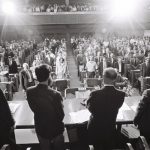 1990 – In a referendum, 88.5% of Slovenia’s total electorate vote for independence from Yugoslavia. This referendum would later lead to what would be called the Eight-Day War between Slovenes and the former Yugoslavs. This brief conflict would end with the victory of the Slovenian army and at the same time, the formalization of the full independence of the country.
1990 – In a referendum, 88.5% of Slovenia’s total electorate vote for independence from Yugoslavia. This referendum would later lead to what would be called the Eight-Day War between Slovenes and the former Yugoslavs. This brief conflict would end with the victory of the Slovenian army and at the same time, the formalization of the full independence of the country.






